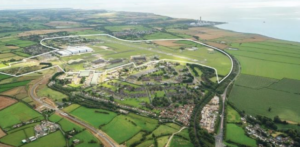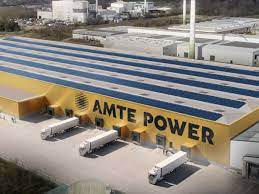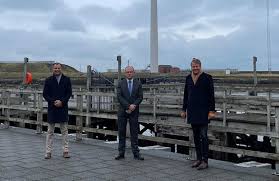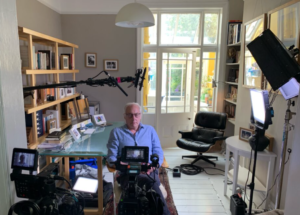- ‘Lies, damned lies etc…’ - 13th February 2026
- Missing in action - 12th February 2026
- Travel news again - 11th February 2026

News that massive subsidies for battery companies around the world are attracting green energy companies in the UK, and that there is a major lack of a home-grown battery industry, underline how Wales could have become a leader in the field when one firm declared it would come but abandoned the plans.
Apart from the global subsides, a scheme has also been prepared to build a huge gigafactory in Somerset, and there are fears that Wales may now have missed out in the rush towards green energy by being distracted over the debacle about Britishvolt (BV), who said they would base themselves in the country but failed to come.

If approved, the plans for construction of the huge Somerset gigafactory on a ‘smart campus’ called ‘Gravity’ near Bridgewater, could create one of the largest buildings in the UK, at 1.1 million square metres.
It may be a success which BV was not, and The Eye were alone in first revealing that this business was established by a man convicted of tax fraud, and which ditched the planned site in the Vale of Glamorgan, despite the fact its proposals had been greeted with a huge fanfare by politicians and reporters in the mainstream media.
Abroad too, battery-making and clean energy are attracting vast sums.

Manufacturers of electric car batteries are lining up for cash handouts available under America’s Inflation Reduction Act (IRA), which is sucking up investment. Goodies are also on offer from the EU’s rival package of green incentives, known as the Green Deal Industrial Plan.
There are more than 100 planned gigafactories in China and around 40 either already up and running or in the works in continental Europe. In America, which is offering subsidies worth up to half of a battery plant’s operating expenses, investment into electric-vehicle and battery plants surged to more than $73 billion in 2022 alone, up from $6.2 billion in 2019. amte Power, one of the UK’s few surviving battery-makers, is considering shifting manufacturing to America.

Individual continental European countries are stumping up cash as well. For each truck it builds, a firm in one country (which says it is “Leading The Electric Charge”), for example, could receive up to £90,000 more in grants in Germany than in Britain.
Andy Palmer, the chairman of InoBat, a Slovakian battery company, says the company is deciding between the UK and Spain for its next battery plant, but Europe’s counter to President Joe Biden’s green push makes it harder to justify a move to Britain for him.
The problem of the UK’s lack of a large gigafactory on these shores (or subsidies for one) has made headlines too. As the Daily Telegraph (DT) has put it: “The trouble is, Britain has failed to create a homespun battery industry”.

All of this only serves to underline the huge let down when controversial BV scrapped its proposed site in the Vale of Glamorgan, even though there had been strenuous reassurances about it.
One of the men in charge of BV, claimed he had looked at more than 100 sites for its green battery factory, before alighting on a former RAF base in Bro Tathan near St Athan.

This comment from BV’s ‘Chief Executive’ Orral Nadjari appeared to chime with others from senior politicians who welcomed the news.
The Secretary of State for Wales at the time, Simon Hart MP, said it was “fantastic that we can talk about Wales as being a leading contender” for the UK’s first gigafactory.
Others, even more important, backed the company.

BV was once touted by former Prime Minister Boris Johnson as a key part of his green industrial revolution, but its £4 billion project in the North East of England (after plumping for a site there instead of one in South Wales) came close to collapse more than two years ago.
Perhaps emphasising what then happened, our research could find no record of any director having a background in battery manufacturing. Despite this the South Wales venture was met with wild acclaim in the mainstream media.


BBC Cymru Wales (BBC CW) declared: “The firm behind a proposed battery factory which could create 4,000 jobs has listed a site in Wales as its ‘preferred option’”. The website WalesOnline (WO) published: “Plans for a giant factory and thousands of jobs for the Vale of Glamorgan have been revealed. Battery manufacturer Britishvolt announced … that two sites are in the running for their factory, with Bro Tathan business park (near St Athan) leading the way”. It stated later: “Plans for a factory producing electric car batteries that would bring thousands of jobs for the Vale of Glamorgan have moved a step closer.”.

This was The Times: “Ambitious plans have been revealed for Britain’s first gigafactory capable of producing enough fuel cells and battery packs to power 100,000 zero carbon electric cars. The project in south Wales, which is designed to put the UK in the race to be a global hub for the electrified vehicle industry, comes from Britishvolt, a start-up company founded by a Swedish automotive entrepreneur best known as a former associate of Vladimir Antonov, the jailed Russian businessman. Britishvolt has unveiled plans to build a gigafactory capable of producing 10 gigawatt hours (GWh) of lithium ion batteries a year from early next year at Bro Tathan, on the Cardiff airport commercial complex where Aston Martin Lagonda has opened its new carmaking factory.”

The scheme for South Wales, though, was soon stopped by BV, yet crucial facts about the men behind it could have been easily discovered.
Neil Moore, leader of Vale of Glamorgan council, was enormously disappointed at their failure to come, and said: “They were given a better deal elsewhere. I was surprised when they pulled out”.
 BV had apparently acquired the Blyth site over the Welsh alternative because of better connections to renewable power sources such as windfarms in the North Sea, as well as an interconnector to Norway’s hydroelectric power – with timing difficulties in Wales also allegedly a factor.
BV had apparently acquired the Blyth site over the Welsh alternative because of better connections to renewable power sources such as windfarms in the North Sea, as well as an interconnector to Norway’s hydroelectric power – with timing difficulties in Wales also allegedly a factor.

However investigations by our journalists at Companies House (CH) and elsewhere, disclosed that a prominent director of BV was Couroush (or Courosh) Alai who until recently lived in a modest apartment at Lily Street in Cardiff, which appeared to be a terraced house converted into flats.
The organisation’s original Chairman and co-founder, Lars Carlstrom,, had been involved in a coach company at Coventry that was in debt to creditors for around £1 million. He had also been director of a watch manufacturer called Thrupp and Maberly which has now been dissolved. In 2011 it had first come to light that Mr Carlstrom was the “representative in Sweden“ of Vladimir Antonov who had been jailed for fraud. Mr Carlstrom was involved, too, in a sale and leaseback deal of property and plant belonging to the Swedish car maker Saab.

At an extradition hearing, the former ‘representative’ of Mr Carlstrom, Russian-born Mr Antonov, who once owned Portsmouth FC, said that the charges against him were part of a politically-motivated plot. Mr Antonov, whose father was shot and injured in Russia in 2009 over a suspected business dispute, claimed that he was at risk of attack in prison if he was sent abroad to stand trial.
Meanwhile before the announcement that the new plant would be built in Northumberland as opposed to South Wales, Mr Nadjari declared: “The first UK gigaplant will… be in an alternative location (to South Wales) which we will be announcing soon”.

In the way the news of the ‘alternative location’ (Blyth) was welcomed, there would seem to be an uncanny echo of what happened in South Wales.
The Blyth Valley MP, Ian Levy, stated at the time: “This is an incredibly exciting announcement that will have a massive impact in the constituency and the surrounding area for decades to come”.
Unfortunately there would be no massive impact for the area or for anywhere else, because BV soon went belly up altogether.


In The Sunday Times (ST) it was published: “Britishvolt’s inevitable journey towards disaster has been, well, a very British story…The electric car battery factory planned for Blyth, near Newcastle, had no customers and no products. One of its founders had no automotive experience. The other had a conviction for tax fraud in the 1990s. Britishvolt wanted millions of taxpayers’ pounds for its gigafactory”.

As this report alludes to, the UK Government had committed a total of £100 million worth of taxpayers’ money to BV for the project, and it is understood the firm wanted to draw down nearly a third of the funding early, but officials refused.
The past, foo, of its original directors raised serious questions, with Mr Carlstrom being convicted of tax fraud in Sweden.
After his conviction, BV’s Chief Strategy Officer of BV, Isobel Sheldon, said the operation was severing all ties with him. Mr Carlstrom was also handed a four-year trading ban in the late 1990s. He was later, too, accused of acting negligently by Sweden’s tax authority over a separate unpaid bill for one of his companies in 2011. In leaving BV, Mr Carlstrom said: “I don’t wish to become a distraction”.
With this sort of background, the recent information about BV came as no surprise to critics of the scheme online, and as the website North East Bylines (NEB) had put it about Mr Carlstrom earlier: “He was the same individual whose track record had been queried by The Eye when reviewing the proposed location in Wales in July last year, and who seems still to be a major shareholder”.
 But as the report showed, our research featured in publications in the North East of England after the firm had declared that it would not, after all, build the St Athan plant in the Vale of Glamorgan and move to Blyth instead.
But as the report showed, our research featured in publications in the North East of England after the firm had declared that it would not, after all, build the St Athan plant in the Vale of Glamorgan and move to Blyth instead.

The website said: “In July 2020 this (the plans for the battery factory) seemed a welcome bonus for Wales and the prospects of a large new green manufacturing capability with thousands of jobs could only be good news. Except, however, when doubts were quietly raised by The Eye, an investigative news and journalism website ‘looking into misdemeanours by organisations and individuals in Wales and the UK’”.

Perhaps, like NEB and us, prominent politicians and the mainstream media should have looked more closely at a company which said it was coming before backing it so publicly, as it was established by a man found guilty of fraud, and now green energy companies going elsewhere around the world have only highlighted this fact…
The memories of our Editor Phil Parry’s astonishing 39 year long award-winning career in journalism when the interesting backgrounds of individuals were uncovered, as he was gripped by the rare neurological condition Hereditary Spastic Paraplegia (HSP), have been released in a major book ‘A GOOD STORY’. Order the book now!

Regrettably publication of another book, however, was refused, because it was to have included names.
Tomorrow – how the role of journalists like him is to see through contradictions and report truths, so he will look at the latest opinion polls which show people oppose immigration, yet also support the benefits it brings…









